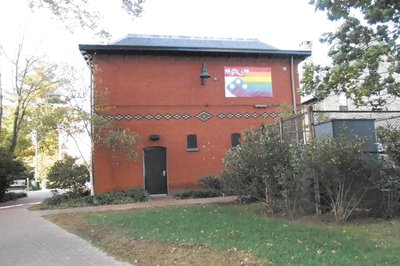University of Pennsylvania is gearing up to celebrate a milestone in its efforts to foster a diverse and inclusive environment for the LGBT and ally communities.
During this weekend’s Homecoming celebration, LGBTs and supporters will gather to pay tribute to 30 years of work done by the Penn LGBT Center, as well as to mark 10 years at the center’s current location. The celebration will be held 9-11 p.m. Oct. 27 at the center, 3907 Spruce St.
In 1981, a gay student was beaten inside of his residence hall, which served as the impetus for the university hiring Bob Schoenberg, founding director of the center, in the fall of 1982 in a part-time role to work on safety concerns regarding homophobia on the campus.
“Penn’s campus back in the earlier 1980s was largely hostile to lesbians and gays,” said alum Liz Cooper, a 1983 graduate. Cooper said a friend was severely beaten, largely because of his sexual orientation, and that a leader of Lesbians and Gays at Penn was mailed a dead animal.
She said men and women of color, as well as those who defended their rights, also received death threats.
“Certainly there were plenty of loving, supportive and caring people, but there was a huge intolerance and fear that made Penn back then a pretty unpleasant place to be,” Cooper said.
In 1982, the newly founded LGBT program was granted a small space within the Student Activities Office; however, as the organization quickly built a following, Schoenberg said it was “bursting out of the space.”
Schoenberg took on the director role full-time in 1989 and the program was established as a physical “center” on Locust Walk in the 1990s.
As support grew over the years, the center’s programming expanded.
Schoenberg said the mentor program, in which students can meet one on one with a peer at the center or via email, is one of its most popular services.
“It is student-to-student and we have 50 pairs,” he explained. “Identity is kept confidential for students who participate.”
Sophomore Christian Cortes, treasurer of Queer Student Alliance, said the center was influential in the founding and growth of many of the university’s early LGBT groups, which were not always met with support.
“However, through the support of Bob Schoenberg and the center, groups were able to thrive and by the 1990s, more LGBT groups began to form, resulting in the large constituency we have today,” Cortes said.
The university’s LGBT alumni group currently has more than 2,000 members.
As the LGBT community and the center grew, supporters began considering options for expanding the center’s space in the late 1990s.
“We knew we had to get donors,” Schoenberg said.
In 2000, two Penn alumni who were Microsoft employees at the time made a donation to the center, which fueled the 2002 move to and renovation of the Carriage House, the center’s current location. Through more donations from supporters, the center was able to become professionally staffed and now employs three full-time and two-part time employees, as well as 14 students in a work-study program.
The building, which features unisex restrooms and is wheelchair-accessible, offers a common meeting place for more than 20 groups — including non-specific organizations like Penn’s Student Government Association and LGBT groups like J-Bagel, Queer Ladies, Penn Allies and Athletes Tackling Homophobia, Queer Undergraduates in Engineering, Science and Technology and Queer People of Color.
Cortes, who performs his work-study as a development assistant at the center, said QSA members rely heavily on the facility.
“QSA uses the LGBT Center for all its general body meetings in addition to using it for events such as the Gay Affair, the traditional new student orientation event QSA throws every year,” he said.
Cortes is also co-chair for Q Penn Week, and said the center’s staff has been influential in helping to book speakers for the celebration and to “ensure that the event runs smoothly.”
That support is ever-present for the campus’ LGBT and ally students, he said. “The center has been so responsive with student requests and all issues that if any arise, they are resolved as soon as possible.”
Since the center’s inception, a lot has changed within the Penn community regarding LGBT issues, Schoenberg noted.
“There is a running joke that people who are homophobic are in the closet, not the LGBT community,” he said. “[Being homophobic] is really frowned upon here.”
The university has received many LGBT accolades over the years, in which the center undoubtedly played a large part, including its recent naming by Campus Pride as one of the nation’s top-10 trans-friendly schools.
Cortes said the center’s reputation is well known among both LGBT and non-LGBT Penn community members.
“The center, in most eyes, appears as the most open-minded and comfortable space on campus. Anyone, regardless of ethnic, religious or political background, is welcome to the center and its seemingly infinite number of services.”
Cooper credited the work of Schoenberg and the countless students, staff, faculty and alumni who have supported the center over the years with changing the environment on campus.
“If you had told me in 1982 that we’d have the Carriage House, that Penn would be ranked as an LGBT-friendly campus, I would have looked at you like you were crazy,” she said. “It brings a huge smile to my face and makes me very proud of my undergraduate university and Penn and the risk people took to make it the place it is today.”
Registration for the anniversary celebration, which is ’80s-themed, is required. For more information, call 215-898-5044.
